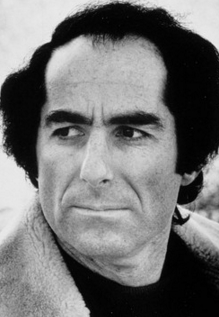On this date in 1933, author Philip Milton Roth was born to Herman Roth and Bess (Finkel) Roth in Newark, N.J., where he grew up with an older brother. He encountered anti-Semitism at an early age and later wrote that his childhood love of baseball offered him “membership in a great secular nationalistic church from which nobody had ever seemed to suggest that Jews should be excluded.” At Bucknell University he decided the school’s “respectable Christian atmosphere [was] hardly less constraining than [his] own particular Jewish upbringing.”
After earning a master’s in English in 1955 from the University of Chicago, he taught there for two years and started writing short fiction. Roth published Goodbye, Columbus, a collection of short stories and the title novella, to critical acclaim in 1959. He then worked as a visiting lecturer at the University of Iowa Writers’ Workshop, followed by two years as a writer-in-residence at Princeton University. Letting Go (1962) was his first full-length novel. When She Was Good (1967), which Roth once called a “book with no Jews,” is also his only novel to feature a female protagonist.
He had married Margaret Martinson in 1956. They separated in 1963 and she died in a car accident in 1968. Martinson was the inspiration for female characters in several of his novels, including Lucy Nelson in When She Was Good. He didn’t marry again until 1990, when he wed English actress Claire Bloom. They divorced in 1995, after which she published a memoir that described their marriage in detail unflattering to Roth. Both marriages were childless.
Roth started teaching literature in the late 1960s at the University of Pennsylvania. The 1969 feature film adaptation of Goodbye, Columbus coincided with the publication of Portnoy’s Complaint, which soon became a best-seller amid controversy for its prurient content. (Those who’ve read it will likely not forget Portnoy’s “affair” with a slab of liver.) Roth’s works in the 1970s included a Richard Nixon parody titled Our Gang, The Breast, The Great American Novel and, what some consider his best novel, My Life as a Man. Three novels (The Ghost Writer, Zuckerman Unbound and The Anatomy Lesson) were published in one volume in 1985.
The 1990s saw publication of Deception, Patrimony: A True Story, Operation Shylock, Sabbath’s Theater and a trilogy consisting of American Pastoral (which won a Pulitzer), I Married a Communist and The Human Stain. He remained prolific after the turn of the century with The Dying Animal, The Plot Against America, Everyman, Indignation, The Humbling, Nemesis and Exit Ghost, the ninth book narrated by Zuckerman, Roth’s fictional alter ego.
Roth won a slew of writing awards besides the Pulitzer and eight of his novels were adapted for movies. He was awarded the 2010 National Humanities Medal by President Barack Obama at the White House in 2011. He died of congestive heart failure at age 85. (D. 2018)
PHOTO: Roth in 1973.


